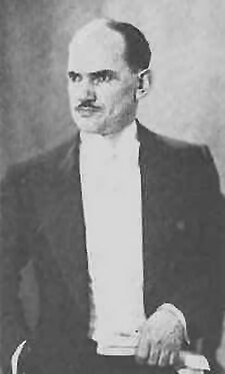
Back إلياس بازنا Arabic İlyas Bazna AZ Елиаза Базна Bulgarian Elyesa Bazna Czech Elyesa Bazna Danish Elyesa Bazna German Elyesa Bazna Spanish الیاس بانزا FA Elyesa Bazna French Elyesa Bazna GL
Elyesa Bazna | |
|---|---|
 Elyesa Bazna (Cicero) | |
| Born | Elyesa Bazna 28 July 1904 |
| Died | 21 December 1970 (aged 66) |
| Resting place | Friedhof am Perlacher Forst, Munich, Germany[1] |
| Nationality | Ottoman of Albanian descent |
| Other names | Cicero |
| Known for | Espionage for Nazi Germany |
| Father | Hafiz Yazan Bazna |
| Relatives | Major General Kemal (Uncle). |
Elyesa Bazna (Turkish: [ˈeljesa ˈbazna]), sometimes known as Ilyaz and Iliaz[2] Bazna (Albanian: [iliaz bazna];[3] 28 July 1904 – 21 December 1970), was a secret agent for Nazi Germany during World War II, operating under the code name Cicero.
In 1943, Bazna was hired as a valet by Hughe Knatchbull-Hugessen, the British ambassador in Ankara, Turkey. He photographed British documents in Knatchbull-Hugessen's possession, and sold them to the Germans through their attaché Ludwig Carl Moyzisch in what became known as the Cicero affair.
As Cicero, Bazna passed on important information about many of the Allied leaders' conferences, including the Moscow, Tehran and Cairo Conferences. The details for the Tehran Conference were important for Operation Long Jump, the unsuccessful plot to kill Franklin D. Roosevelt, Joseph Stalin, and Winston Churchill.
Bazna had also conveyed a document that carried the highest security restriction (BIGOT list) about Operation Overlord (the code name for the Invasion of Normandy in June 1944). It included intelligence that the British ambassador was to request the use of Turkish air bases "to maintain a threat to the Germans from the eastern Mediterranean until Overlord is launched." The information about the Normandy Invasion was not known by the Germans until after the war. Had it been provided in time, Operation Overlord (the preparations for D-Day) would have been compromised. He also provided intelligence that might have made the Germans believe that there was no danger of attack in the Balkans.[4]
The information that he leaked is believed to have been among the more damaging disclosures made by an agent during WWII. The German Foreign Office questioned the reliability of the intelligence provided by Cicero due to the large quantity of transmitted documents, which meant that apparently little, if any, of it was acted upon.[4] It seems likely that he had received some intelligence training from the Italian secret intelligence service, SIM. This would explain much, for as Wilfred Dunderdale later stated, "We always thought Cicero was an Italian agent because of his modus operandi - they gave their agents special training in locksmithery and in infiltrating diplomatic households."[5]
After the war, Bazna lived in Ankara with his family for many years and obtained work doing odd jobs. Much of the money the Germans had paid him was revealed to be counterfeit. He moved to Munich in 1960 and worked as a night watchman before dying in 1970 of kidney disease. In 1962, Bazna published a memoir about the Cicero affair.
- ^ Auer 1995, p. 239.
- ^ BBC 2005.
- ^ Foreign and Commonwealth Office historians 2005, p. 6.
- ^ a b Adams 2009.
- ^ Brown, Anthony Cave (1975). Bodyguard of Lies. Harper & Row. p. 400.